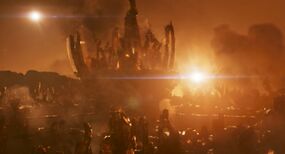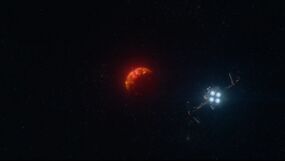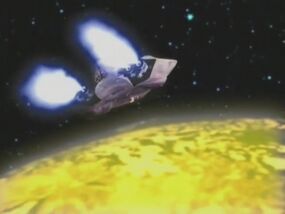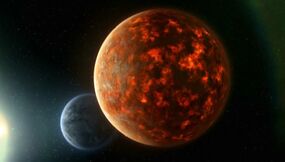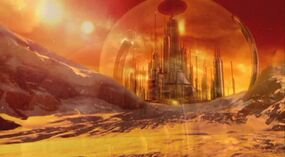Gallifrey
- You may be looking for the audio series.
Gallifrey was the homeworld of the Time Lords. (TV: The Time Warrior) By one account, the planet was actually named Jewel (COMIC: Return of the Daleks) and another it was spelt Gallefrey. (PROSE: Time is Everything) During several time wars, the Great Houses utilitarianistically referred to it as the Homeworld, (PROSE: Damaged Goods, The Book of the War, etc.) while other civilisations called it the Houseworld. (PROSE: Of the City of the Saved...) During V-Time, Cwej usually referred to his Superiors' planet as their Base of Operations. (PROSE: A Bright White Crack) The literal translation of the name "Gallifrey" was "They that walk in the shadows", (PROSE: The Pit) and indeed, "the Shadow People" was one of the names given to the planet's inhabitants. (PROSE: A Bright White Crack)
Gallifrey and all its cloneworlds were destroyed in the War in Heaven. (PROSE: The Ancestor Cell, The Adventuress of Henrietta Street) A group of Oldblood Great Houses created many "lesser Homeworlds" which fought simplified models of the War in bottle universes and oxbow realities. (PROSE: A Prelude to a Prelude)
Conflicting accounts on its fate in the Last Great Time War existed. By one account, it was destroyed when either the Eighth Doctor or the War Doctor used the Moment to engulf it and seal the event inside a time lock. (PROSE: Doctor Who and the Time War, COMIC: Sky Jacks) However, according to most accounts, it was only believed to have been destroyed in the Time War (TV: The End of the World) because it was actually frozen in a pocket universe by at least thirteen incarnations of the Doctor (TV: The Day of the Doctor, The Time of the Doctor, etc.) and later discovered at the end of the universe. (TV: Hell Bent) By this point in their history, the Time Lords were wary of being discovered alive, although they still continued their mission to ensure nothing threatened the Laws of Time. (PROSE: Lords and Masters)
The Spy Master was later revealed to have been responsible for leaving Gallifrey in ruins after finding out the truth about the Timeless Child. (TV: Spyfall) After the Master used the corpses of the Time Lords he'd killed to create a new race of CyberMasters, Ko Sharmus detonated the death particle to stop him, wiping out all organic life on Gallifrey. (TV: The Timeless Children, Revolution of the Daleks)
In the final moments of the universe, Winkle's Wonderland was built on the remains of Gallifrey, and renamed appropriately. (AUDIO: Zagreus)
Location
Gallifrey was located in the constellation of Kasterborous at galactic coordinates 10-0-11-0-0/0-2 from Galactic Zero Centre. (TV: Pyramids of Mars, Full Circle, Death in Heaven) Several accounts placed it more or less at the centre of its galaxy. (PROSE: The Devil Goblins from Neptune, Interference - Book Two, Human Nature) Indeed, I.M. Foreman once specified to the Eighth Doctor that it wasn't in "the exact dead centre, but it's as close as you can get without ending up in a black hole". (PROSE: Interference - Book One) According to another account, the Eighth Doctor explained to humans Grace Holloway and Chang Lee that Gallifrey was "[o]n the other side of your galaxy" and "250 million light-years away" from Earth. (TV: Doctor Who) Another put Gallifrey 30,000 light-years from Earth. (PROSE: The Devil Goblins from Neptune) It was described as "the Shining World of the Seven Systems". (TV: The Sound of Drums)
Alongside its physical location, the Homeworld also occupied a unique place in the structure of history, an exclusive time stream from which history could be observed. While some accounts indicate this anomalous status always existed, influencing ancient Gallifreyan connections to time, and was merely hastened by the Eye of Harmony, (PROSE: Lungbarrow, Gallifrey - Notes on the Planet's Background) another indicated it was created during the anchoring of the thread, when the planet was removed from the Spiral Politic and re-engineered into a biodata-enabled receiver and processor of information, becoming the central node of history. (PROSE: The Book of the War)
Shortly before the War in Heaven, Greyjan the Sane's plan for creating clones of Gallifrey was implemented. (PROSE: The Ancestor Cell) By the fiftieth year of the War, it was unclear if the original Homeworld was still located in its original place or if it had been moved elsewhere and replaced with a decoy; (PROSE: The Book of the War) it was rumoured that not even the Lord President knew which Gallifrey was the original. (PROSE: The Taking of Planet 5) A group of Oldblood Great Houses created many "lesser Homeworlds" which fought simplified models of the War in bottle universes and oxbow realities. (PROSE: A Prelude to a Prelude)
All the Gallifreys, seemingly including the original, were ultimately destroyed during the War in Heaven along with the Time Lords. (PROSE: The Adventuress of Henrietta Street) One account showed the Eighth Doctor destroying what he believed to be the original Gallifrey in an effort to stop the War. (PROSE: The Ancestor Cell) Many other accounts showed that the Doctor, either as the Eighth Doctor (PROSE: Doctor Who and the Time War) or as the War Doctor, (COMIC: Sky Jacks, TV: The Name of the Doctor, etc.) destroyed or seemingly destroyed "Gallifrey Original" on the last day of the Last Great Time War to save the rest of creation. (TV: Dalek, The End of Time) On that day, in an effort to avert its destruction, Gallifrey was removed from the time lock and relocated near to Earth by Rassilon, who hoped thereby to enact the Final Sanction. The Tenth Doctor returned it to the time lock by shooting and destroying the diamond which connected Gallifrey to Earth. (TV: The End of Time)
In the end, after the interference by future versions of the Doctor, Gallifrey was not destroyed but frozen in time in a pocket universe for its own protection by at least thirteen incarnations of the Doctor. (TV: The Day of the Doctor) Missy later told the Doctor that Gallifrey had returned to its original position. The Doctor travelled to these coordinates and found only empty space, believing Missy to have lied. (TV: Death in Heaven) Gallifrey had in fact returned to the universe as Missy said. However, it had been placed at the extreme end of the time continuum for protection. The Eleventh General described Gallifrey's location as "the end of the universe, give or take a star system". (TV: Hell Bent) By the time of its destruction by the Spy Master, Gallifrey was once again located in a "bubble universe". (TV: Spyfall)
Astronomical data
Worldline
Gallifrey itself was protected by a complex temporal defence, its worldline twisted and warped through all eleven dimensions to hide it from Enemy attack. (PROSE: The Quantum Archangel)
Size
Gallifrey was several times larger than Earth. (TV: The End of Time) According to another account, however, Gallifrey was the same size as Earth. (PROSE: Dead Romance)
Star system
Gallifrey was in a binary star system. The second star seemed to rise in the East in the morning, making the mountains glow, (TV: Gridlock) and both set in the South. (PROSE: The Bloodletters) The main star was large and golden red. (AUDIO: The Forever Trap) The Monk believed that the Homeworld had not originally been part of a binary system, but had been retroactively engineered into one by He-of-Many-Epithets as a precaution during the war against the vampires: the interaction of the orbital patterns of the two suns created a shifting "interference pattern" in the daylight which meant that even vampires resistant to ordinary sunlight could not walk on the Homeworld without burning. Because of these "mad orbital mechanics", the planet had "an unconventional day-night terminator": as the Monk put it, "the region in darkness [shrank] like an iris and close[d] like a fist". (PROSE: The Bloodletters)
In one reality, Gallifrey and Earth shared the same gravity, the same distance from the same type of sun and with it the same length of day and year, a fact which fascinated the Time Lords. (PROSE: The Infinity Doctors)
It was located in one of Earth's twelve Zodiac signs. (PROSE: A Tour of the Capital)
The system contained five other planets, (TV: The Invasion of Time) among them Karn, (TV: The Brain of Morbius, AUDIO: Vortex Ice) Reave, (AUDIO: A Heart on Both Sides) and Polarfrey, as well as an asteroid named Kasterborous the Fibster. (PROSE: Lungbarrow)
Satellites
Gallifrey had at least two large moons and a ring system, similar to Saturn in Earth's solar system. (COMIC: Agent Provocateur) One of the moons was the copper-coloured Pazithi Gallifreya, which shone so brightly it could be seen during the day. (PROSE: Cat's Cradle: Time's Crucible, Lungbarrow) Gallifrey's moons perished with the Daleks when Gallifrey disappeared. (COMIC: Agent Provocateur, TV: The Day of the Doctor)
Landscape
From orbit, the planet's surface appeared mostly barren, with only a few visible buildings. (COMIC: Return of the Daleks) Its landscape was rust-coloured, with brown lakes and grey clouds. (PROSE: Cat's Cradle: Time's Crucible) Following the Last Great Time War, it was still rust and brown coloured but had a more volcanically-active appearance. (TV: The End of Time)
During her departure from the planet in the Doctor's TARDIS, Susan Foreman observed Gallifrey as a "brown-green, snow-capped planet on the TARDIS scanner." (AUDIO: The Beginning)
Susan once told a Sensorite that her planet was similar to Earth, however with the sky turning burnt orange at night and that the planet had bright silver trees; (TV: "A Desperate Venture", PROSE: The Sensorites) later accounts identified this planet was Gallifrey and added that it boasted snow-capped slopes of red grass, with the silver trees reflecting in the morning sunlight, making it look like the forests were on fire. (TV: Gridlock) There were also green forests, golden fields, and red deserts, (PROSE: Cat's Cradle: Time's Crucible) but overall it was a much drier world than Earth. (PROSE: Lungbarrow) The Sixth Doctor once declared the climate to be "like the Serengeti all year round". (PROSE: Spiral Scratch) There was also a river called Lethe. (AUDIO: Master) The wastelands around the Capitol were referred to as "outer Gallifrey" by the Time Lords. (TV: The Invasion of Time) Rassilon later referred to the area that the barn in which the Doctor had slept as a child as the Drylands, claiming that no one of importance lived there. (TV: Hell Bent)
Most of the mountainous southern hemisphere had a fierce and wintry landscape. (PROSE: The Scarlet Empress)
The sky during the day resembled that of Earth's blue sky. (TV: The Invasion of Time) As such, the shift from night to day (and vice versa) appeared to be half orange and half blue. (TV: The Day of the Doctor)
Known geographic features
Regions of Gallifrey
The Citadel was located on the continent of Wild Endeavour. (TV: The Sound of Drums)
The Drylands were on Gallifrey, typically the area where, according to Rassilon, "nobody who mattered" lived. (TV: Hell Bent)
The Death Zone was an area used as a battleground in which Time Lords would watch other species fight to the death. Although these battles were stopped by Rassilon, the Death Zone remained and later became home to the Tomb of Rassilon. (TV: The Five Doctors)
Arcadia was Gallifrey's second city. (TV: The Day of the Doctor)
The black, friable spires of Yarvelling's Church from Skaro were a fragment of the Last Great Time War. According to one account, the Eighth Doctor saw the Cathedral fused with fragments of Morbius' Red Capitol in the backwater where he triggered the Moment. (PROSE: Doctor Who and the Time War)
There was also a mountainous region known as South Gallifrey, (TV: State of Decay) which was outside the territory of the Great Houses. (PROSE: The Return of the King)
Killer Cats lived in Gin-Seng. (AUDIO: Erasure, The Last Fairy Tale, etc.)
Mountains
Mount Cadon (PROSE: Timewyrm: Revelation, Lucifer Rising, The Three Paths) was also known as Mount Lung (PROSE: Lungbarrow, The Three Paths) and Mount Plutarch. (PROSE: The Three Paths)
The Citadel of the Time Lords was located in the mountains of Solace and Solitude. (TV: The Sound of Drums)
Other mountains on Gallifrey included Mount Perdition (TV: The End of Time) and the Mountain of Serenity. (PROSE: The Stranger)
The Myridian mountains separated the Arcadian desert from the lowlands of Outer Gallifrey. (AUDIO: Mistfall)
Rivers, lakes, and oceans
There were at least two known rivers and more than two lakes: Cadonflood River, (PROSE: Lungbarrow) the Lethe river, (AUDIO: Master) the Lakes of Iridescence, (AUDIO: The Conscript) Lake Calasper, (PROSE: The Day of the Doctor) and Lake Abydos. (AUDIO: Neverland) Less than half of Gallifrey's surface was covered with water. (PROSE: Coldheart)
Peculiar geology
Some crystals were found only on Gallifrey, including White-Point Star diamonds (TV: The End of Time) and Kyfred Gems. (GAME: Lost in Time)
Relationship with the Time Lords
A Time Lord had a deep, almost metaphysical bond with their planet; as one account put it, "to any Time Lord, Gallifrey [was] a part of [their] very being". (PROSE: Warmonger) Renegade Time Lords who left the planet still tended to hold a distant hope or intent of someday returning to their homeworld; (TV: An Unearthly Child, PROSE: Warmonger) it was thought that "permanent exile was death of the soul", and a death sentence would be more merciful on a Time Lord criminal than permanent exile from Gallifrey. (PROSE: Warmonger) After Gallifrey was destroyed by the Eighth Doctor, (PROSE: The Ancestor Cell) the surviving Time Lords suffered adverse consequences: the second heart of a Time Lord provided a link between them and their homeworld, such that with said homeworld no longer existing, their second hearts became poisonous to them. (PROSE: The Adventuress of Henrietta Street)
History
- Main article: Gallifreyan history
Gallifrey existed as early as the Dark Times. (COMIC: Old Girl) The Kotturuh visited during this period and judged its people as having much to offer in the future. (PROSE: The Knight, The Fool and The Dead) The Dalek Time Squad was ordered to attack Gallifrey in this time period by the Emperor. Gallifrey was defended by the Eighth, Ninth and Tenth Doctors aboard the Donna until Inyit’s judgement threw the Dalek forces into chaos. (PROSE: All Flesh is Grass)
Gallifrey was originally ruled by the Pythias. The last Pythia was overthrown in a revolution led by Rassilon. (PROSE: Cat’s Cradle: Time’s Crucible) Rassilon founded a new society of Time Lords on Gallifrey, (TV: The Deadly Assassin) alongside Omega (TV: The Three Doctors) and an other. (PROSE: Remembrance of the Daleks)
Rassilon brought the Eye of Harmony to Gallifrey, providing power (TV: The Deadly Assassin) and acting as a “hitching post” for the Web of Time. (AUDIO: Neverland) This gave Gallifrey a special relationship with time. (PROSE: Lungbarrow) After generations of work, the Disciples of Omega created the Transduction Barriers to protect Gallifrey. (AUDIO: Renaissance)
During the Fourth Doctor's era, Gallifrey came under attack by a joint effort of Vardans and Sontarans. (TV: The Invasion of Time) The planet was also targeted by Dominators and their Quarks, though they offered no serious risk to the Time Lords. (AUDIO: Time in Office)
An incarnation of the Doctor who lied in the Seventh Doctor's future (COMIC: Party Animals) knew that his homeworld was destroyed in a traumatic incident, leading to him giving up his name and status as (PROSE: Cyber-Hunt) an incarnation of the Doctor (COMIC: Party Animals) to ensure the man in black restored the planet. (PROSE: Cyber-Hunt)
During President Romana's tenure, Gallifrey was opened to aliens, with official embassies being established, (PROSE: Lungbarrow) and alien students permitted at the Time Lord Academy. (AUDIO: Lies) Later in her presidency Gallifrey suffered much damage due to the civil war precipitated by Pandora seizing power as Imperiatrix, (AUDIO: Imperiatrix, Fractures, Warfare) with the Transduction Barriers failing in its aftermath. This allowed a brief incursion by Sunari troops into the Capitol until K9 restored the barriers. (AUDIO: Appropriation)
In preparation for war, Gallifrey was duplicated in the Nine Gallifreys project. (PROSE: The Shadows of Avalon) The enemy destroyed the original Gallifrey during the War in Heaven, though the Time Lords continued fighting from the other Gallifreys. (PROSE: Alien Bodies) One Gallifrey was destroyed by the Eighth Doctor. (PROSE: The Ancestor Cell)
During the Last Great Time War between the Time Lords and the Daleks, Gallifrey was on the "furthest edge" of the fighting, (PROSE: A Brief History of Time Lords) though did come under direct attack on occasion; these included the Sicari incursions, (AUDIO: Assassins) a siege by the Dalek Emperor's flagship armed with Null Zone technology, (AUDIO: Homecoming) and the Barber-Surgeon's campaign which threatened the planet's time lock. (AUDIO: The Mission) During the conflict sky trenches were used to defend the planet. (TV: The Last Day)
On the final day of Time War, the entire might of the Dalek race laid siege to Gallifrey, successfully invading Arcadia. (TV: The Day of the Doctor) Believing the Doctor would precipitate their ultimate demise on that final day through the Moment, the High Council led by President Rassilon, enacted the Ultimate Sanction, attempting to breaking the Time War's time lock by materialising Gallifrey in Earth's skies in 2009 to begin a rapture to tear the Time Vortex apart. However, the Tenth Doctor sent the planet, Time Lords included, back to its doomed fate, by breaking the link that brought the Time Lords to Earth. (TV: The End of Time)
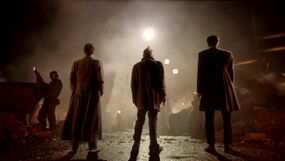
Several different accounts of the Fall of Gallifrey at the end of the Time War existed. While one account showed Gallifrey being destroyed by the Eighth Doctor when he used the Moment to end the Time War, (PROSE: Doctor Who and the Time War) and one source claimed that millions of Time Lords indeed died in an instant when the War Doctor ended the Time War, driving the Matrix to madness in the process. (COMIC: Sky Jacks) However, most other accounts indicated that Gallifrey and its inhabitants had not actually been destroyed, but rather frozen in time in a pocket dimension, "like a painting" as the War Doctor put it, by the first thirteen incarnations of the Doctor. (TV: The Day of the Doctor) As such, Gallifrey only seemed as if it had been destroyed to the rest of the universe, allowing the Time Lords to persist in secret. The Curator even suggested that hundreds of incarnations of the Doctor past and future had arrived to save the planet. (PROSE: The Day of the Doctor) The vast majority of the Daleks died in the crossfire when Gallifrey disappeared, (TV: The Day of the Doctor) with most of the survivors running away in terror to parts unknown at the sight of this sudden and incomprehensible victory by their greatest enemy. (PROSE: The Day of the Doctor)
The Eleventh Doctor would subsequently spend 900 years (PROSE: Tales of Trenzalore: The Eleventh Doctor's Last Stand) defending a crack in time linking Gallifrey with the planet Trenzalore. (TV: The Time of the Doctor) The Twelfth Doctor unsuccessfully attempted to find the planet after Missy told him untruthfully that it had returned to its original position in time and space, (TV: Death in Heaven) and finally spent 4.5 billion years (TV: Hell Bent) trapped inside a confession dial, gradually beating his way through a wall of solid azbantium, until he finally broke through, revealing a portal back to Gallifrey. (TV: Heaven Sent) The Doctor learned that at some point, Gallifrey was unfrozen and moved to "the end of the universe give or take a star system" for its own protection. Clara Oswald suggested that the Time Lords moved Gallifrey there to hide as "everybody" hated them. After returning, the Doctor overthrew Rassilon and used an extraction chamber to save Clara's life before fleeing once more in a stolen TARDIS. (TV: Hell Bent)
At some point, the Spy Master returned to Gallifrey while it was hiding inside a bubble universe and learned that its entire history had been "built on a lie". Enraged, he ravaged the planet and left it in ruin. Upon encountering the Thirteenth Doctor, the Master persuaded her to visit the planet again to observe the destruction. (TV: Spyfall) Its ruins later appeared at the Boundary, where the Master met the Thirteenth Doctor once again, promising that "everything [was] about to change". (TV: Ascension of the Cybermen) The Doctor returned to Gallifrey with the Master who used the Matrix to reveal the truth about the Timeless Child and Gallifrey's history to the Doctor. The Master invited Ashad and his army of Cybermen to the planet and attempted to create an army of CyberMasters out of the Time Lord corpses. However, the Cybermen were defeated by the Doctor and her companions while Ko Sharmus detonated the death particle to stop the Master, wiping out all organic life on Gallifrey, the Master and CyberMasters presumably included. (TV: The Timeless Children) The Doctor later told Ryan that all life on Gallifrey had been destroyed thanks to Ko Sharmus and the death particle. (TV: Revolution of the Daleks)
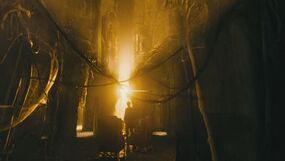
A history book stated that, mere moments away from the heat death of creation, all that remained was a couple of scattered immortals and Gallifrey. It described Gallifrey as having been “returned from the pocket universe” it was hidden in. (PROSE: The Whoniverse) At the very end of time itself, part of the Cloisters were preserved in a reality bubble sustained by Me, who claimed to be the last immortal, so she could watch the end of everything. The Twelfth Doctor visited there with talk to Me about the Hybrid. After the discussion, the two left in the TARDIS he had acquired, after which the reality bubble gave out and the universe finally ended. (TV: Hell Bent)
Settlements
The central hub of Gallifrey, and the capital of the Time Lords' power, was the Capitol. (TV: The Deadly Assassin) It was also known as the Citadel, (TV: The Invasion of Time) although some accounts suggested one was a subset of the other, in either direction. (PROSE: Gallifrey: A Rough Guide) The Tenth Doctor referred to it as "the Citadel of the Time Lords". (TV The Sound of Drums)
By the time of the Last Great Time War, Gallifrey had a so-called "second city", Arcadia, which was protected by a large number of sky trenches. These defences failed on the last day of the Time War, and the city was ravaged by the Daleks. The War Doctor was present at the Fall of Arcadia, and it was there that he left his warning of "No More" for the combatants. (TV: The Day of the Doctor)
Some accounts claimed that more than these two many cities existed. In the early days of Gallifrey, many smaller settlements existed outside of the Capitol, such as that of Slothe, which was known as the home town of the mythical Presus. (PROSE: Blind Fury) Even in the modern Time Lord age, cities on Gallifrey included Trigovia, (AUDIO: The Conscript) Prydos, (PROSE: Gallifrey: A Rough Guide) and the Three Minute Cities, (PROSE: The Gallifrey Chronicles) which in one state of reality included the city of Olyesti. Also existing in that reality was Old Harbour. (PROSE: The Infinity Doctors) During the War in Heaven, Christine Summerfield had a dream which seemed to be a vision of the Homeworld, in which "all the cities" were empty because the Homeworlders had all retreated underground. When she arrived there in reality, she found the cities not only empty but in ruins, and believed their inhabitants had all retreated into the bottle universe, wrecking the planet behind them to prevent their enemies drawing any clues from the ruins. (PROSE: The Bloodletters)
Colonies
Dronid and Karn were colonies of Gallifrey. (PROSE: Shada, Alien Bodies, Cat's Cradle: Time's Crucible) Trakkiney was colonised in the earliest days of Rassilon's era. (PROSE: The Labyrinthine Web) Another colony was Cartago. (PROSE: The Bloodletters)
Native species
Flora
Gallifrey had a wide variety of plant life, ranging in colour from silver to green and golden. Known plant species included the Schlenk Blossom, (PROSE: Island of Death) ulanda, (PROSE: Blind Fury) and the Madevinia aridosa. (PROSE: Cat's Cradle: Time's Crucible) The Master's father's estate was lush with red grass. (TV: The End of Time) The Third Doctor also once said that there were daisies on Gallifrey. (TV: The Time Monster) Weanskrike and Tristort grew on Mount Lung. (PROSE: The Three Paths) There was also a red flower that resembled a cross between a rose and a daisy, known to Gallifreyans as a Sarlain. (PROSE: Timewyrm: Revelation) The Flower of Remembrance was a six-petalled yellow flower, (PROSE: The Infinity Doctors, The Ancestor Cell) and one of the few symbols of death on the planet. (PROSE: Dead Time, The Ancestor Cell) Another flower grown on Gallifrey was a moonlight bloom, which, according to the Eighth Doctor, was symbolic for peace and meditation, until it became a symbol of cowardice among Time Lord soldiers during the Time War. (AUDIO: The Conscript) There were trees on Gallifrey which bear large, yellow, edible fruit. (PROSE: The Twins in the Wood)
Fauna
Animals native to Gallifrey included flutterwings, (TV: The Pirate Planet) flies, (TV: Heaven Sent) Woprats (PROSE: Heart of TARDIS) broakirs, trunkikes, yaddlefish, (PROSE: Blind Fury) flubbles, (PROSE: Island of Death) tafelshrews, (PROSE: Cat's Cradle: Time's Crucible) plungbolls ,(AUDIO: The Ghosts of N-Space) rabbits, (AUDIO: Caerdroia) rovies, (AUDIO: No Place Like Home) mice, cats, (TV: The Mark of the Rani, PROSE: Human Nature) the Killer Cats of Gin-Seng, (AUDIO: Erasure, PROSE: The Return of the King) pig-rats, (AUDIO: Panacea) cobblemice, (PROSE: Unnatural History, The Gallifrey Chronicles) and, of course, the Gallifreyans themselves. Dogs with black-and-white striped fur and which made mewing noises were found in forests on Gallifrey. (PROSE: The Twins in the Wood)
In the past, the dinosaur-like Gargantosaurs lived on the planet. (COMIC: The Stolen TARDIS) According to one account, no animal had gone extinct from the planet. (PROSE: The Last Dodo) However, according to another account, a large lizard-like creature that had been placed out of its time in the Death Zone was described by the War Doctor as "a long-extinct species from before the Time Lords ever walked the planet". (PROSE: Engines of War)
Behind the scenes
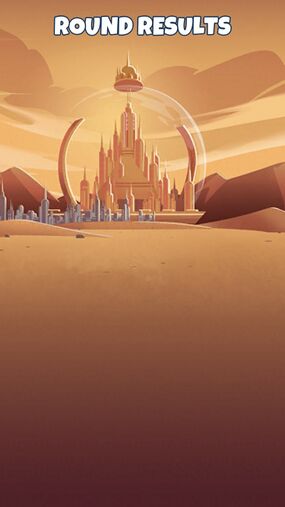
- Although the planet was referenced numerous times earlier, and even seen on occasion (TV: The War Games and The Three Doctors for instance), the name Gallifrey was not uttered on screen until Jon Pertwee did so in The Time Warrior. In the revived series, the name Gallifrey was mentioned for the first time in The Runaway Bride.
- In the original script of The Time Warrior, Gallifrey was scripted as "Galfrey", but was later changed.
- Even though the first on-screen mention of Gallifrey was in The Time Warrior, broadcast in December 1973, the word appeared in TV Action #126, put out for the week ending 14 July 1973. There, in the letters column, the editors responded to a question from Simon Still of Kent who asked where the Master came from. The answer? "The Master's home planet was called 'Gallifrey'." This probably doesn't mean, however, that Polystyle gets the credit for "Gallifrey". Since shooting on The Time Warrior wrapped on 12 June 1973, and the scripts had been completed earlier that spring, the likelihood is not that the TV Action originated the name, but that they were given it by the Doctor Who production office.
- Despite the name Gallifrey being established in 1973, the 1975 Polystyle comic story Return of the Daleks names the Time Lord home planet as "Jewel".
- In the 2019 television series Good Omens, during the scene where Crowley considers fleeing to another planet, his Extremely Big Book of Astronomy includes a page on Gallifrey. The caption beneath it reads "Jewel, the Shining World". This title had not been used for Gallifrey in any previous story, but had originated in the infobox of this Tardis Wiki article, whose list of alternative names began "Jewel, the Shining World of the Seven Systems", concatenating titles given for the planet in COMIC: Return of the Daleks and TV: The Sound of Drums.
- Gallifrey was used as a background during the Doctor Who Event in the crossover video game Funko Pop! Blitz.
- AUDIO: R&J implies that Jack Harkness and River Song were causing the noise heard in Listen, with Jack also referencing a woman waiting to play a game of chess, implying that Gallifrey was the planet that Orson Pink wound up on.
External links
- The Homeworld at the Faction Paradox wiki
- Gallifrey at Marvel Database
- "Rassilon, Omega and that Other Guy": informally named but very exhaustive website compiled Gallifrey information from all media, with speculation (clearly labelled as such)
- Discontinuity Guide article on the location of Gallifrey
| |||||||||||||
| ||||||||||||||||||||||||||||||||||||||||
